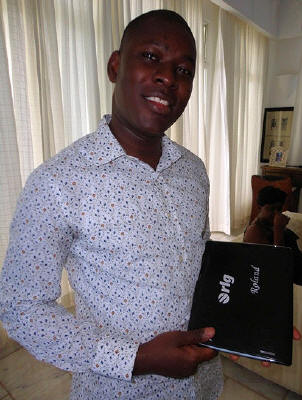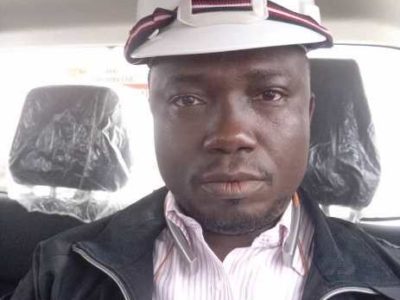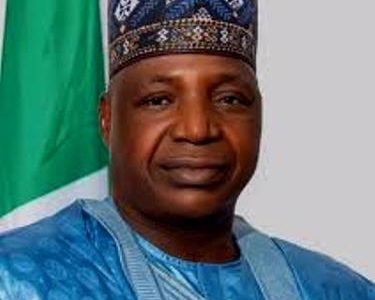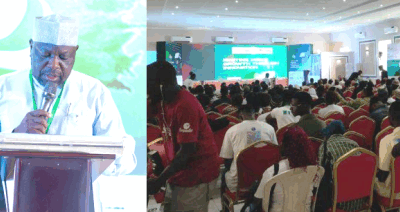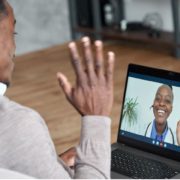The first impression you have of Mr. Roland Agambire, Chief Executive Officer of rlg Communications, is that of a motivational speaker. Since 2006, Agambire’s rising profile has put him at the forefront of Africa’s unfolding technology- business space. Since he reconfigured a company he founded as a cybercafé to become a technology product manufacturer,
Agambire has become one of the increasing number of technopreneurs daring to challenge the foothold of China and India in the global IT market and urging home governments on the African continent to refocus their economy through policy thrust and action plans aimed at creating human resource to manage Africa’s fledgling ICT industry. At rlg Communications, Osu, Accra, Ghana, Agambire and his team are channeling energy at building an army of IT trained Africans from the large pool of unemployed youths. He says the future is in Africa’s human resource and if the continent must take charge of its own economic destiny in the new Knowledge Economy, it must prepare its youths for the future now. Agambire has remodeled the business of IT solutions based on training thousands of youths first and then building an IT manufacturing enterprise on the trained resource. He says the model sustains the growth of the compnay’s increasing capacity to produce state of the art products from handsets, laptops, LCDs to Ipad. Agambire shares his vision with SEGUN ORUAME, IT Edge News in Banjul, The Gambia where rlg Communications is tidying up on opening a local manufacturing factory in partnership with Gambian based Unique Solutions Limited
What is rlg Communications, how did it begin?
rlg Communications is a company in Ghana. It began by trying to take advantage of the emergence of ICT which has become an
integral part of everybody’s life in terms of finding solutions to environmental problems. Again, look at the Internet. It
has become influential whether in our social or business life. In the year 2001, rlg saw the advantage of this by trying to
establish itself as an Internet solutions business and has grown overtime from being a small time Internet access provider,
a cafe and a local name to finally becoming the flagship rlg Communications. As rlg Communications, we have moved being
just a local name to being a brand that people can relate with, hold it and make it their own. In 2006, we progress from
being an Internet café into the sale of computers. Then we saw in the emergence of the mobile phone vast opportunities for
new level of growth, Different kind of phones were flooding the country, but the problem was how do you get all these
things repaired when they are destroyed? How do you find solutions to problems that are associated with gadgets like this?
There was no service center that people can walk in to get those kind of problems fixed so rlg Communications saw it as an
advantage. We saw a lot of talents in the African youths that can be harnessed to provide these services. We saw an
opportunity to guaranty job security and enhance the livelihood of the youths by giving them training in mobile handset
repairs and unearthing their talent. At that time Ghana employment programme was keen at given employment to youths in
Ghana, rlg approached government in that respect that this was an area where jobs could be created so government partnered
with rlg Communications to start the training of youth in this area. The first batches of people trained were set up and
government was impressed that the people were contributing socially and also given back to their family. This allowed rlg
Communications to expand its training programme and having had the experience of training these people, knowing the
problems associated with mobile phones and all that, it was on me that it is not just repairing a phone that was the
ultimate. I had become more concerned with the question of how do we get around and get involved in something we can come
out that would compete in the world market. We needed to move to the level of knowing the secret of where the gadgets and
the components were coming from. What does it take to have a phone dismantled and put together? The training had exposed
us all that rlg Communications could enter into the global market and compete fairly with the kind of technology associated
with mobile phones.
When was the first rlg phone unveiled?
In the year 2008
In essence, in the last three years you have not been importing phones but making them. How have you been able to walk around funding faced by Africa entrepreneurs and human capacity which was the first area you wanted to address before moving to making phones locally?
Funding has never been a problem when it comes to entrepreneurship. I have always said that it doesn’t matter the amount of
funding you have. The most important thing is have an idea that is workable and solvable and then the fund by itself will
follow. So many times when you rest entrepreneurship on capital, you are making a very big mistake; there are many factors
that create a business. Yes! Capital is one of them, human resource base; but the idea and the solution you found around it
that will rest not rest solely on the capital, but more on the human resource that you are going to organize and make sure
that you found solution to it. Now why did I say that, in the year 2008, when we were thinking about rlg products, somebody
asked, who will even appreciate phones made in Africa? The idea in itself is nice but how do you convince the Africa person
that it is no longer the thinking that Africa cannot handle this but we have the solution by giving them the right product,
and then investing in the human capacity so that when you have enough product put in the market, when they try it, they
will have confidence in it and they will come around you, and that will create a commercial value for the business to grow.
So the human factor comes first?
The first thing is investing in the human resource base because training the people in the first place was one of the areas
we have to establish the human resource. If we didn’t have people in the mobile phone repair business who have been to the
training, who know the right component in the production process; you cannot wake up and have mobile phone to sell in the
market, there is no way you will survive in it. But we have created the human resource base that is technically inclined in
handling these gadgets, so have people confident in bringing a product from the scratch to the end. We have proven that if
the African child is exposed, he can compete favorably with his counterpart anywhere in the world. If we get to know of any
expertise, we bring him in and establish a relationship, and then make him to train these people who will handle these
things, and after that training, it is enough for the people to carry on; these are the kind of things we do, we have all
kind of engineers from China, Japan and the rest of the world. It is a global world and it is a global village where you
don’t have it all. We have been able to create the platform where these experts are now associated with their Ghanaian
counterparts. We send Ghanaian engineers to go learn in various factories, and they have been able to get grasp of most of
the things and take it from there, so in trying to build that capacity, we created quality phones in the market. When
people started using rlg phones they felt like they have been using the phones in the market with a different brand name
because what they get from other brands, they get from rlg, so they saw rlg as a brand product that they have been used to.
But if you put capital first and feel that you want to go and look for money to buy or produce phone, you will fail; you
don’t need that, you first needed to create that environment of the human resources and imbue sufficient confidence in the
human resource that will directly yield the result. I did not go to any bank and started begging that I needed money. Ideas
are what businesses thrive on. When government saw that the idea was laudable, it invested into it. So you have to have
capacity as a visionary entrepreneur to have idea that can solve societal problems, this alone creates enough funding for
you. You don’t need to go round seeking for fund everywhere rather you need to have ideas that can translate into solving
problems.
You are creating a product that must operate within a global market. To produce rlg phones in Ghana may give the Chinese phone maker a competitive advantage in terms of better infrastructures, fairer tax environment, easier access to bare-bone materials required to produce these phones and probably a higher level of support from the government. If you put all these together, how do your own products compete with others, and why should I go for rlg in terms of affordability and not LG or Samsung?
This competition is not a war front thing. It is again, idea-based and that is what rlg Communications has been able to
beat China even in the development of the product. Now, it is a fact that in the Chinese environment they are closer to the
raw material but don’t forget the raw materials come from Africa but unfortunately we don’t have the capacity to turn the
raw materials into a finish product that can use for other products. We established our office in China, a fabrication
factory where we are getting the raw material close from China and Japan and then assemble in Ghana. Now, looking at the
competition, you need to build a conscious bond, and again, how do people relate to a brand? Today’s world has moved from
production to brand consciousness. People can only associate with the product when they are closer to the brand. We have a
robust plan with a good team, market strategy that enhance a brand in the mind of people that makes them feel that this is
a brand that is here to stay, this is an elegant brand that brings a different dimension away from the other brands. We
were also able to beat the Chinese because it is cheaper to assemble a product here in Ghana than to assemble it in China.
The Chinese have stayed in the factory for some time now and their cost is rising. Africa is the next place but
unfortunately Africa is not prepared to move and challenge themselves by creating the human resource base that can handle
these things. That is what we are doing; we are strengthening the human resources capital that is why we are moving from
one country to the other creating that resource base. From 2012 to 2013, rlg Communications will start fabricating all its
component in Ghana and this will make it even cheaper, then you will found the Chinese and other brands coming to Ghana
because we will assemble for them because we will be able to fabricate at a lower cost because we have all those thing
that are use to fabricate; silver, copper, aluminum and some of the components that are used in terms of holding main
boards. All these things are visibly presence in Africa, what we lack is the machine and the human capacity to deliver. We
are training people today in our factory in China and moving all that to Africa because in two to three years to come,
China will be too expensive like Europe and America and the next destination would be Africa. We are not waiting to see
Africa become the cheapest destination before we start; we have started three years ago. So for now, we are able to beat
other brands because we are the cheapest even in terms of assembling, so any phone we produce ends up cheaper than the one
in China.
You have an MOU with Osun State government in Nigeria, what does it entail?
We are training 20,000 youths in Osun State and we have started the infrastructure work. We will kick up this project in
the next few days to come, actually our commercial activities are going to be in Lagos but we will establish an assembling
plant in Osun State to serve the whole of Nigeria. Nigeria is populous and a big country, we don’t want to be assembling
from Ghana. So our criteria now is any government that want rlg Communications in its country must first of all agree to
train 10, 000 minimum in that country because any factory we want to establish will not take less than 5000 to 10, 000
people. We are not just doing only mobile phone now, we are doing LED, LCD, laptops, desktops and other gadgets. We have
jobs for all these people and there is no problem establishing that because of the kind of training we are giving to the
people. Ghana has had its own experience, it is a matter of preparations, Osun is number one, Lagos is talking to us,
Rivers State is talking to us, Kwara State is talking to us and host lot of other states in Nigeria are keen in replicating
this in Nigeria. So we see a big challenge coming from Nigeria, but we are ready to handle all these challenges, we will
establish the base with the first 20, 000 we are going to train, and most of them will train others in other states.
Are you building a company whose ownership is jointly owned with state governments?
No! What we do is when we go to a country, we let the country own it, so rlg Communications Nigeria functions as an
independent company from rlg Communications Ghana, even in Gambia, we have rlg Communications Gambia though a little
distinctive but there is always a partnership agreement with local indigenous people who have their root to replicate what
has already been done in Ghana. Normally, what government does is they pay to train their youths and our responsibility is
to train the youths and engage them to secure their future by giving them employment. Apart from that, we don’t have any
relationship with government ownership in term of giving partnership to government.
Africa is the next big thing in terms of ICT, practically in the last three years that rlg Communications has joined the
fray, what are those challenges and frustrations you have faced as an entrepreneur doing business in Africa?
Africa has resources but turning these resources into the consumer stage is missing. Therefore it has a large vacuum for
talent grooming and all that you faced as an entrepreneur whether in the marketing of the product or in the creation of the
product rests on this vacuum. Now, when you look at the talent grooming, you don’t have a lot of people willing to take
this thing as a professional thing because you are faced with people who don’t even believe in what you do. ICT is fast
moving but it is not moving in Africa, so having people understand that this is where we are going and people must match
out to fill the space is a challenge. You have the challenge of getting the youths to understand that and for them to
follow you. A lot of talent is being wasted not because it is not needed but because the people cannot find their bearing;
this is big challenge for a lot of business. You see a lot of people with certificates, but they cannot actually fashion
out what you want from them; they come with big degrees but they cannot match it with talent. This is a big challenge for
entrepreneurs when you need professionals like that who can be able to manage the day-day business so that you can focus
your attention in developing the ideas, creating the business. Secondly, Africans have become enemy of our own in term of
technology, when a technology is being developed and tested by Africans, the trust in it is very slow, that again is a huge
challenge, so you have to invest so much money to build trust for people to believe it, but if it is created outside
Africa, it is easier for people to buy it. But in all, I am satisfied that at the end of the day, there is some hope at the
end of the tunnel.
Who is Roland Agambire?
Roland is an African from Ghana, an entrepreneur trying to find an opportunity for other people wherever he find business
opportunity, trying to create new things, platform for youths and other people to progress. I have always love doing
business from my childhood and never get tire of doing business and ensuring that the African flag is raised high and
making Africans feel they have the rightful place in the world of business and technology because where we are moving,
technology has become the hub of everything.
What scares you most?
What scares me most is I hate greed with passion because when you are seriously thinking about creating opportunity, a lot
of people in the system who are determine to take more than what you keep for them, and by so doing they cut short the
vision and opportunities of others. That has been a scaring thing to me because I want to see a business that will live
over ten generations. But what scares me is mostly Africa businesses don’t live more than two generation because of greed.
‘A lot of talent is being wasted not because it is not needed but because the people cannot find their bearing; this is big
challenge for a lot of business’
‘You see a lot of people with certificates, but they cannot actually fashion out what you want from them; they come with
big degrees but they cannot match it with talent’
‘When a technology is being developed and tested by Africans, the trust in it is very slow … you have to invest so much
money to build trust for people to believe it, but if it is created outside Africa, it is easier for people to buy it’
‘Africa businesses don’t live more than two generation because of greed.’.

